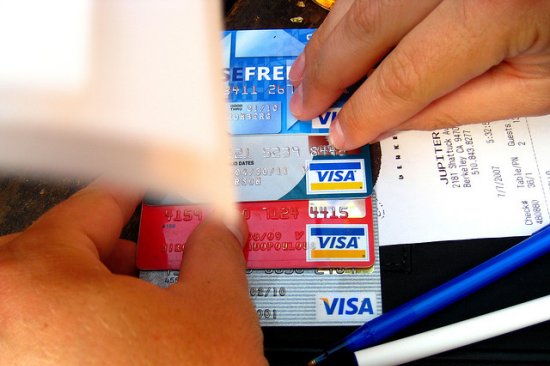
#1 Don't utilize more than 30% of your available balance
If you use too much of your available revolving credit line, your credit score will drop. If it looks like you're maxing out your credit lines, this is a warning flag to other potential lenders. You should never rack up more than 30% of your credit limits. The 30% is against your total available credit, not a single card. For instance, if you have three cards with limits of $3,000, $2,000 and $4,000, your total line is $9,000. That means you shouldn't have more than $3,000 charged in total across all cards at any time.
#2 Set credit alert limits
To ensure you don't miss payments and don't go over limits, use your credit card's online alerts. You can usually set several alerts including payment reminders and balance alerts when you hit a certain spending threshold. Alerts keep you from logging and checking your accounts constantly while still protecting your credit score by keeping to recommended limits and making all payments on time. If your card doesn't allow you to set payment reminders, use your smartphone calendar.
#3 Pay on your cards each time you get paid
Rather than paying once a month on your credit cards, why not pay each time you get paid? Most people are paid bi-weekly, and this can be a good way to make sure you don't go over limits or miss a payment without taking a chunk out of one paycheck a month. Also, if your payment due date falls right when you have a lot of other bills due, contact your card issuer and ask them to move your due date permanently to a better time of the month. Most issuers will have no problem doing this for you.
#4 Don't buy things you can't pay cash for
Use your credit cards wisely. If you can't afford an item, you shouldn't swipe to buy it in most cases. If you have a bill due before your paycheck comes in, like a utility or cell bill, using a credit card to pay it is okay if you pay yourself back as soon as you get paid. But using credit cards to buy spendy electronics and other items you know you can't pay off when the credit card statement comes due is unwise. Instead, use no interest layaway and pay for the item over time or save up and then buy.
#5 Look for a rewards card
Rewards cards can be a great way to make the most of credit card spending but should be carefully considered. If the cost of interest and fees outweighs the rewards benefits, you may want to look for another card. And make sure that you still earn rewards for spending even if you pay off your balance in full each month. If your rewards card isn't a good deal, look for a better deal and close the other account if it comes with an annual fee. If it's a no-fee plan, keep the card but don't use it.
#6 Ditch annual fee cards
Annual fee cards are money down the drain. The only time you may have to suck it up and take a fee-based card is if your credit isn't great and you don't get competitive offers. But if you have a healthy credit score, there's no reason to accept an annual fee card. If you have a good payment history, contact your card issuer and ask them to waive the fee permanently. If they refuse, shop around for a new card and close down the old one. Annual fees significantly increase the cost of credit and are unnecessary.
#7 Pull credit reports regularly
You should also regularly check to make sure your credit report is accurate when it comes to your credit card history. Check for credit card accounts that don't match the cards in your wallet – this may indicate that someone has used your identity to get new credit. Make sure there are no late payments showing if you're always a prompt payer. Each credit reporting agency must give you one free report each year. Instead of pulling an all-in-one annually, pull a single one every four months so you can monitor your credit year-round for free.
Please read the original post on our affiliate site, BillsBills.com
